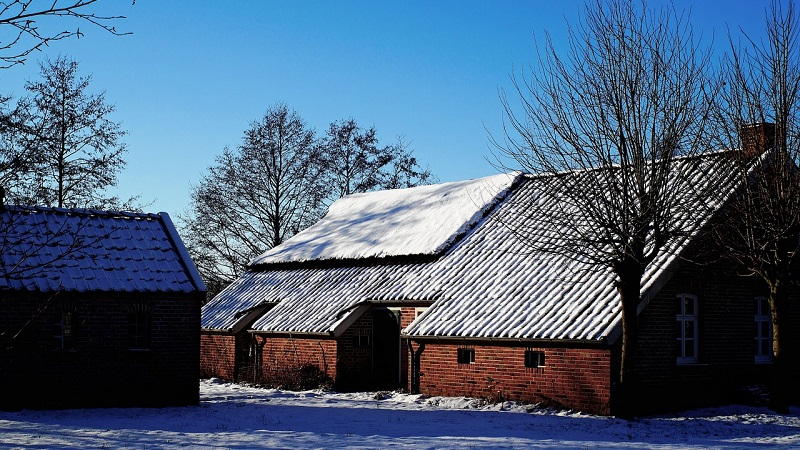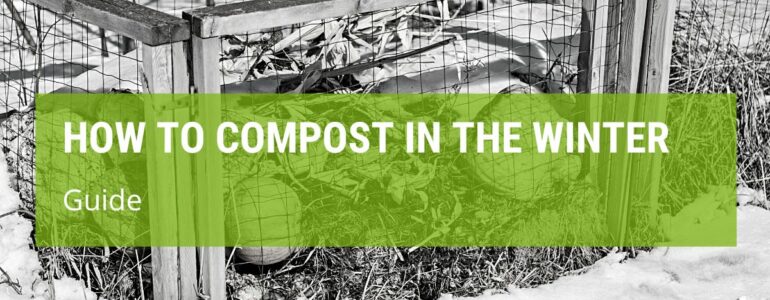Composting is a wonderful thing – it stops too much wastage, plus it’s really good for the garden and it can help to grow the next year’s crop of flowers and vegetables too!
However, winter can be a tricky time in the garden – nothing much grows, and everything freezes. How to compost in the winter may be on your mind – and it’s on ours, too!
How To Compost In The Winter

Compost is a wonderful thing – it uses up lots of garden leftovers, plus it’s great for feeding other plants.
However, compost likes to be warm to allow the microorganisms, bacteria and fungi to get to work. As such, how can you compost in the winter?
Well, there are a good few things you can do to keep your compost going during the colder months, so that it’s ready to go when it gets warm again.
- If your compost heap is open, cover it with a tarp or cardboard to keep as much of the warm in (and as much of the wet out) as possible.
- Try to avoid turning it too often in the winter, as this can release the heat that the process needs to keep going.
- Keep an eye out for rats, which might seek out the warmth of the compost and tunnel through it, again releasing the heat.
- If you have a closed compost bin, site it where it gets most of the sun in the summer, so that it can be as ready as it can be for the colder months.
- Ensure that the lid is watertight, so that the black gold inside doesn’t get diluted or colder than it needs to be.
- Continue to add to the compost even in the winter – go for a 50:50 brown:green waste as you normally would.
Here’s a useful little article explaining about winter composting.
What Temperature Is Too Cold For Compost?
We all know that a compost heap likes to be kept warm, for the decomposition process to take place.
But what about the winter, when temperatures can get seriously low? What happens to all your precious compost then?
Well, it will actually be fine. The only time the process will actually stop is if the temperature drops below freezing.
Because of the heat generating by the composting process, the inner parts of your heap, at least, should stay warm enough to stay alive.
Of course, the composting will slow down considerably in the colder months, but it will not stop completely.
Keeping your compost insulated, whether you have an open pile of a bin, is one of the best ways to keep everything going.
If you have a bin, keep it in the warmest part of your garden in the summer, so it can build up the heat to keep it going through winter.
For an open pile, you can insulate with fleece, cardboard or plastic, to keep the warm in and the rain off.
How Can I Speed Up My Compost In The Winter?
Although the temperatures are dropping and you may be concerned about your compost pile, there are things you can do to ensure it still lives its best life in winter.
- Increase nitrogen. Adding nitrogen-rich foods to your compost pile will help the bacteria – things like coffee grounds are great for this.
- Turn it. Turning the pile regularly will distribute the nitrogen all over – just make sure you don’t do this too often as the pile can get cold.
- Increase the volume. Topping up your pile once in a while can help the bacteria to generate more heat to keep them going.
- Keep it moist. Compost does best when it allowed to get humid, so adding a sprinkle of warm water, or adding “brown” materials like pine needles, can really help.
Here’s a good video which can give you tips on speeding up your compost:
What Are Cold Compost Methods?
Cold composting works very well, in some cases equally as well as the other types that rely on warmth to aid the bacteria.
Cold composting is pretty basic and actually very easy to do – it basically involves making a pile of organic waste and leaving it to do its thing!
You can use a variety of things to create your cold composter – from old pallets, to just a pile in the yard, or you can use a specifically designed compost bin.
Cold composting is an effective way of composting – it won’t decompose as fast as the warmer types though, so this is something to consider.
Cold compost is generally considered more suitable for people who have a good deal of “brown” rather than “green” waste, because of the slower rate of decomposition.
How Do You Insulate A Compost Bin In The Winter?
It may surprise you to know that compost bins are not actually that affected by atmospheric temperature changes, as they rely on their internal temperature to encourage decomposition.
Of course, when the temperature drops to freezing the decomposition will likely stop, and it will be generally slower when the weather is colder, but it will still be going.
If you want to make an effort to keep your compost bin a little warmer, you can wrap the outside of the bin in fleece or plastic to give it a little more insulation.
The best way to keep your compost going throughout winter is to ensure that your bin absorbs as much warmth during the summer months as possible, so it can keep itself going.
Site your compost bin in the place in your garden which gets the most direct sunlight, and you will probably find that the colder temperatures do not affect it too much!
Final Thoughts
Winter slows down a lot of processes in the garden – but it doesn’t have to slow down your composting!
Once you have a few good ideas about how to compost in the winter, you can get your pile (or bin, or bucket) going and enjoy it with the best of them.







